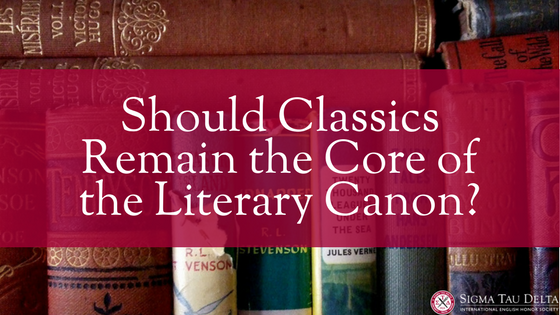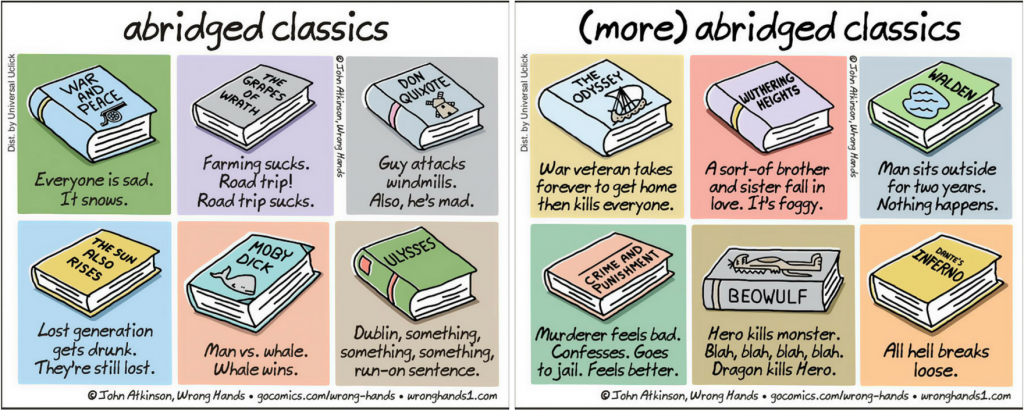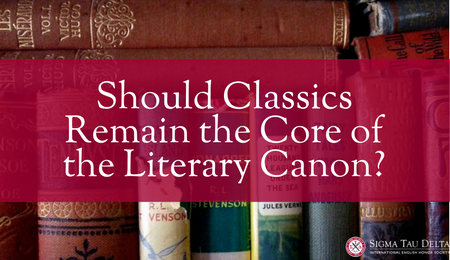 Absolutely! The classic canon matters today, yesterday, and tomorrow because it is uniquely positioned to educate, entertain, and inspire. The classics have an extraordinary range, from The Aeneid to Beowulf, Don Quixote to Anna Karenina, and, of course, the works of Shakespeare. Comedy, drama, tragedy, satire—the classics provide every possible permutation of human emotion in complex characters, storylines, and language.
Absolutely! The classic canon matters today, yesterday, and tomorrow because it is uniquely positioned to educate, entertain, and inspire. The classics have an extraordinary range, from The Aeneid to Beowulf, Don Quixote to Anna Karenina, and, of course, the works of Shakespeare. Comedy, drama, tragedy, satire—the classics provide every possible permutation of human emotion in complex characters, storylines, and language.
Not only do the literary classics provide a sampling of genres to pique interest in the variety and styles of literature, they also serve the immediately relevant point of defining our personal and scholarly ideas. For example, when reading I gravitate toward the epics. However, a fellow student may find epics boring and be drawn to fractured narrative or experimental work. Neither one is “correct” or “incorrect.”
 The classics introduce archetypes, lenses, and allusions, providing a framework that enables readers to compare and contrast with modern, ancient, and experimental texts. Classics are the lingua franca of the academic world, but that does not mean other local varieties are considered inferior or unworthy of attention. In fact, one entire discipline is devoted to comparing the minority canon to the classic canon: comparative literature.
The classics introduce archetypes, lenses, and allusions, providing a framework that enables readers to compare and contrast with modern, ancient, and experimental texts. Classics are the lingua franca of the academic world, but that does not mean other local varieties are considered inferior or unworthy of attention. In fact, one entire discipline is devoted to comparing the minority canon to the classic canon: comparative literature.
Just as we love to experiment with new foods, we must expose our literary palates to what the world has to offer. Think of how boring it would be if, in discussing literature, everyone agreed on everything instead of having different opinions and tastes!
Great literature is also a linguistic time capsule. When I started reading The Canterbury Tales my class observed the differences in phrasing, word usage, and spelling, which gave us an elementary education in linguistics and respect for how the English language and syntax have evolved. In a similar way my Shakespeare class always devoted time to discuss the bawdy elements in the plays, and we discovered an interesting euphemism concerning the word ‘corner’. Great literature connects beautifully to other fields, particularly history, linguistics, and politics.
Furthermore, literary classics are an unparalleled source of inspiration. Theatre and film continue to yield enthralling performances of the classics, while loose re-imaginings of the classics birthed Superman and The Lion King, now cultural icons. And let us never, never forget the many memes, GIFS, or satirical retellings of the classics floating around on the internet.
Ultimately, the real reason I love the canon is because it is entertaining. It may have begun as a way to keep oral history or celebrate deities but I keep coming back to it because becoming engrossed in a good book and then sharing that experience with others is addictive. Reading the literary canon makes us literary citizens who can discuss, argue, and analyze those experiences. The canon contains the classics for a reason; it has been hundreds of years, yet people continue to find new ways to write about these books.
In short, the literary canon should not be viewed as an exhaustive resource but rather as a primer when entering the field of literature. The canon functions as the descriptive commonality between the majority of the academic field and is a tradition we are proud to uphold. The canon is an ever-changing entity, but the classics, I believe, should always remain at its core. And as English majors, it is our goal to devour as much of the canon as possible. Check out this Classic Books Challenge and let us know how many of these books you’ve read!
Now ten points to House Gryffindor if you can comment which classics birthed Superman and The Lion King!
 Elizabeth Upshur
Elizabeth Upshur
Southern Student Representative, 2016-2018
Pi Iota Chapter
Western Kentucky University, Bowling Green, KY






Add Comment